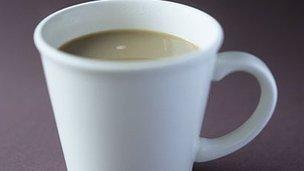How much coffee is safe?
- Published

Caffeine is present in coffee, but also in tea, chocolate and some energy drinks
Large variations in the amount of caffeine present in coffees sold on the high street means our daily caffeine intake may be higher than we think.
But is this a problem? How much caffeine is it actually safe to drink?
The caffeine content of a cup of coffee depends on how big the cup is, how finely the coffee is ground, how dark the roast, the brewing method used, how much coffee is used to make the drink and the type of coffee bean used.
A cup of instant coffee will be different from a mug of brewed coffee, a home-made cappuccino different from a large latte bought in a coffee shop.
Caffeine is also found in tea, chocolate, some soft drinks, and certain medicines.
People are affected by caffeine in different ways too. Some people are more sensitive to its properties than others and have to adjust their intake as a result.
When it comes to pregnant women this is particularly important.
Their daily recommended maximum is 200mg of caffeine, equivalent to two mugs or four cups of coffee.
This advice was issued in 2008 by the Food Standards Agency, which warns that too much caffeine could result in miscarriage or a baby with lower birth weight.
Too much caffeine while pregnant could also increase the risk of some health conditions in later life, the FSA says.
The agency had previously recommended a maximum daily intake of 300mg. However, research published in the British Medical Journal, external, suggested that a lower limit per would help to reduce this low risk even further.
The research found that caffeine was rapidly absorbed into the body of pregnant women and crossed the placenta freely, circulating in the unborn baby.
Too much caffeine intake interfered with blood flow in the placenta and affected foetal growth.
Professor Janet Cade, co-author of the study from the University of Leeds, said: "Everyone wants the best for their baby. Limiting daily caffeine intake is one way which you can ensure your baby has the best start in life."
The Department of Health's Pregnancy Book, external suggests trying to vary the liquids drunk while pregnant, although they say there is no need to cut out caffeine completely.
"Try decaffeinated tea and coffee, fruit juice or water and limit the amount of 'energy' drinks, which may be high in caffeine.
"Don't worry if you occasionally have more than this, because the risks are quite small."
For everyone else, the advice is much less clear-cut.
Coffee can have health benefits. It is thought to increase alertness, performance and mental ability by stimulating the central nervous system.
A large US study found that women who drank two or more cups of coffee a day were less likely to get depressed.
Recent research suggests that coffee could be linked to a reduced risk of prostate cancer and breast cancer and another study said it could protect against the onset of Alzheimer's.
But it can also be addictive, seriously so.
Gaynor Bussell, registered dietician with the British Dietetic Association, says we should all try to drink coffee in moderation while paying attention to our our own bodies.
"Different people have different tolerances. Some people react strongly to caffeine, some don't. It's a question of knowing your own limit and knowing your own body.
"If you enjoy a cappuccino in the morning then that's fine, but if you start to get palpitations, you're running to the toilet or noticing an increase in nervousness and sleeplessness, you should probably cut back your caffeine intake."
The general advice is that four or five cups of coffee a day is safe, around 400mg of caffeine.
The Food Standards Agency says there is no limit set for healthy individuals. They recommend a balance of drinks and a sensible, moderate approach to coffee-drinking.
- Published1 December 2011
- Published27 September 2011
- Published17 May 2011